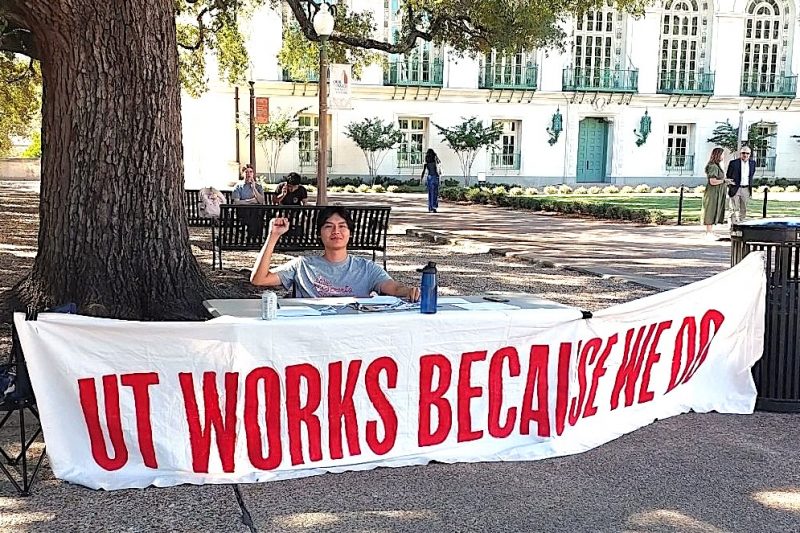New Graduate Workers Union Fights for Better Pay and Protests the College Compact
By Rachel N. Madison
Photography By Rachel N. Madison
Reporting Texas

Graduate Workers Union member Kenton Wu sits behind the group’s banner on the Main Mall. Rachel N. Madison/Reporting Texas
For the past two months, the University of Texas’ newly formed Graduate Workers Union has been advocating for better treatment, pay and rights of graduate student employees. And now it is joining other student groups in opposing a deal with the Trump administration that would transform the university’s governance structure.
“A union is a commitment by workers at a workplace to stand together with each other to be treated the way they deserve to be treated in terms of compensation and working conditions,” said Sociology Ph.D. student and union member Noah DiAntonio.
Their efforts trace back to 2016, when students first organized through a group called Underpaid@UT in response to poor student worker pay. The group helped usher in the launch of several student labor groups, including the Graduate Student Labor Committee and later the Graduate Student Education Task Force.
In 2024, the group decided that the best way to advance its mission of building “long-term power” was to unionize, DiAntonio said.
Founded on Sept. 10, the Graduate Workers Union marks UT Austin’s first grassroots labor union and follows a wave of graduate student unionization across the country.
Since 2012, the number of graduate students represented by unions nationally has increased by 133% to over 150,000, according to a 2024 report by the National Center for the Study of Collective Bargaining in Higher Education and the Professions.
Today, “more than a third (38%) of graduate student workers are now in a union,” the report said.
Unionization may prove especially useful in Texas,where employee protection laws are limited, said employment lawyer Sean Timmons.
“Employers love relocating to the 5th Circuit Court of Appeals because they can treat employees like complete crap and get away with it,” Timmons said, referring to a history of the federal appellate court siding with employers over workers.
Threats are especially prevalent for international workers, who often face ostracization, mistreatment and discrimination due to cultural and racial prejudice, Timmons said. This phenomenon is especially prevalent in Texas where chauvinism can lead to discrimination, he said.
“It is the wild west of employee treatment, and unless you’re fire or police, the state is actively hostile towards unionization,” he said.
This fall, the UT union protested the Trump administration’s proposed Compact for Academic Excellence in Higher Education.
The proposal mandates that universities foster “ideological diversity,” cut “unnecessary” staff and programs, impose limits on international student enrollment and do away with DEI hiring policies in exchange for preferential treatment to federal funding.
“Completely gutting and restructuring liberal arts dept to follow right-wing politics is not in the interest of most grad students,” said union member Evan Scopes Crafts, a Ph.D. student at the Oden Institute for Computational Engineering.
The union fears the compact would hurtinternational student workers and researchers.
“It is an unprecedented attack on academic freedom at the university,” Crafts said.
UT remains one of two schools that have not yet formally declined Trump’s proposal and the preferential funding access its implementation would provide.
“We align with the principles of conduct that they want,” Provost William Inboden said in a recent interview with The Chronicle of Higher Education. However, he added, “as written, some of the procedural enforcements of the compact would clash with state law and some of our other institutional prerogatives.”
Inboden said that the university is “committed to the cardinal tenets of academic freedom,” and that it is in discussion with the White House about the implications of the agreement.
University administrators did not respond to requests for statements about their plans for the compact as the Nov. 21 decision deadline approaches.
While the group hopes they will reach consensus with the institution, they remain doubtful.
“They have shown they will not listen to us if we ask nicely,” said DiAntonio.
Instead, the group is preparing for action.
“Our primary goal is to become strike ready,” said Crafts, who said striking is the most effective way that unions have been able to improve working conditions throughout history.
“We view the union as a lever through which graduate students can have power at the university for all different facets of university life, including economic and workplace issues,” he said.
All states are mandated to allow collective bargaining and striking under the National Labor Relations Act of 1935 for private sector employees. However, striking is prohibited under Chapter 617 of the Texas Government Code for public Texas employees.
The union said it is working to ensure all union members are educated on the legality and consequences of any potential actions taken, including conducting legal consultations with workplace organizing committees and building faculty relationships should students ever need protection.
“We feel very confident with the path we are pursuing,” said Crafts, who said that legal protections can and will change “when the labor power and the pressures put on certain employers are in place.”
For now, the union would only strike after a “long process in which we gave the university repeated opportunities to negotiate in good faith with us,” Crafts said.
The union, which has grown to over 70 members in the past month, plans to focus on increasing membership and one-on-one conversations with graduate students into the new year. At UT, there are around 4,000 working graduate students that would be eligible to join.
“Our goal is that by next fall, every graduate student will know about us and our work,” Crafts said.
They also hope to make their presence more known with university administrators.
“If UT Austin’s administration does not change course, they will find out the hard way the integral role that graduate students play in the university’s teaching and research missions,” said Crafts. “This university cannot run without us.”